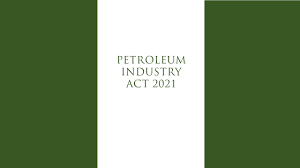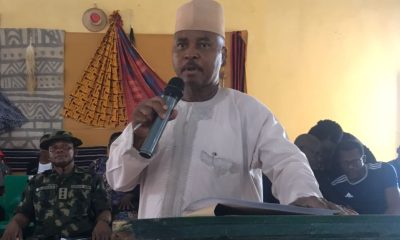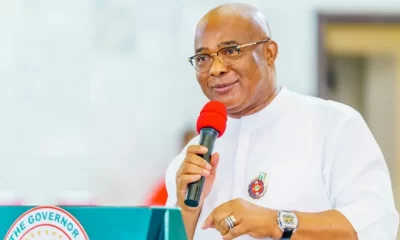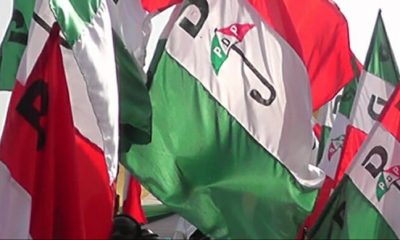Oil & Gas
FG Awards Licences for 161 Marginal Fields as 13 Remain Dormant

The Nigerian Upstream Petroleum Regulatory Commission (NUPRC) has awarded Petroleum Prospecting Licences (PPLs) to 161 successful 2020 marginal fields awardees.
The commission also officially unveiled the Host Communities Development Regulations and model Petroleum Prospecting Licences (PPLs).
Chief Timipre Sylva, the Minister of State Petroleum Resources, at the unveiling and licences presentation on Tuesday in Abuja said the maiden presentation of the PPL was part of the implementation of Petroleum Industry Act (PIA), 2021.
This is as the Federal Government revealed that 13 out of the 30 marginal fields awarded since 1999 were not producing crude oil, as only 17 of the fields were currently meeting the target of crude oil production, adding that a total of N202.
91bn was raked in by the government from the just concluded 2020 marginal field bid round.The award, the government said was pursuant to the provisions of the Petroleum Industry Act 2021.
This came as successful awardees, such as Matrix Energy Group, Petrogas Energy, among others, promised to begin oil search from the fields in earnest to boost the country’s crude oil production.
In his address at the event, the Chief Executive Officer, Nigerian Upstream Petroleum Regulatory Commission, Gbenga Komolafe, stated that one of the major tasks inherited by the NUPRC upon its inauguration last year, was the need to conclude the 2020 bid round.
“Consequently, we pursued the matter frontally and are delighted to inform you that the exercise which commenced in June 2020 is being concluded today,” he stated.
Komolafe explained that historically, the marginal fields award initiative began in 1999 and was borne out of the need to entrench the indigenisation policy of government in the upstream sector of the oil and gas industry and build local content capacity.
He said, “Besides, the initiative was also targeted at creating employment opportunities and encouraging increased capital inflow to the sector.
“Since its inception, a total of 30 fields have been awarded, with 17 currently producing. A breakdown of the allocation of the fields to indigenous operators is as follows: two fields awarded in 1999, 24 in 2003/2004, one each in 2006 and 2007, and two in 2010.
He added, “Ten years after, in 2020, 57 fields were put up for bidding. Again, it is noteworthy that the 2020 marginal field bid round exercise in respect of which PPLs are being issued today has attracted government revenue of about N200bn and $7m (N2.91bn at official exchange rate of N415.64/$) respectively.”
Speaking to journalists on the sidelines of the event, the Group Chief Executive Officer, Matrix Energy Group, Adisa Aliu, said successful investors in the bid round would commence oil search as fast as possible.
Aliu, who’s company emerged successful in the exercise, said the contributions of marginal field operators would help the country in meeting the monthly oil production quota approved for Nigeria by the Organisation of Petroleum Exporting Countries.
For several months running, Nigeria has been failing to meet its crude oil production quota approved by OPEC, a development that has further depleted the country’s revenue from oil.
“We are delighted at the conclusion of this exercise and we are ready to contribute our quota in assisting to meet the target approved for Nigeria and as well help in shoring up revenue for our county,” he stated.
He, however, noted that security should be improved in the Niger Delta, as this had been a challenge to not just the production of crude oil, but to the meaningful progress of the sector.
Meanwhile, the NUPRC in its presentation at the event, stated that the passage of the Petroleum Industry Act had brought an end to the era of marginal field awards.
Section 94(9) of the Act stated that “No new marginal field shall be declared under this Act”.
The agency stated that the Minister of Petroleum Resources shall now award PPL on undeveloped fields following an open, fair, transparent, competitive, and non-discriminatory bidding process in line with Sections 73 and 74 of the Act.
It urged the new investors to hit the ground running in developing their awarded assets in line with industry best practices.
“Also, we shall continue to provide a predictable and enabling regulatory environment to operators in line with our technical and commercial statutory
mandates with a view to optimising the development and exploitation of the nation’s hydrocarbon resources,” it stated.
It said it was worthy of note that the average price of crude oil in recent months had been above $100/barrel, adding that investors in the fields should take advantage of this upward swing in market fundamentals, caused by the Russian/Ukraine conflict.
NEWS
NGEP Urges Gas Reticulation In Buildings

By Olasunkanmi Onifade
Abuja, April 29, 2025 The National Gas Expansion Programme (NGEP) has called on stakeholders to promote the integration of gas reticulation systems in estates, districts, and industrial areas, following best practices seen in developed countries.
Chairman of NGEP, Prof.
Mohammed Ibrahim, made the call on Tuesday during the Builders’ Conference and Annual General Meeting of the Nigerian Institute of Building (NIOB), FCT Chapter, in Abuja.The conference, themed “Gas Reticulation in Building: Design, Safety, Environmental Compliance and Prospects for Builders,” focused on enhancing energy infrastructure in Nigeria’s built environment.
Ibrahim noted that with Nigeria’s vast natural gas reserves, gas reticulation offered a sustainable solution to improve energy accessibility, affordability, and reliability in homes and businesses.
“Gas reticulation in buildings presents a compelling pathway to a more sustainable, efficient, and resilient built environment.
“By prioritising sound design principles and ensuring strict adherence to safety and environmental standards, we can unlock the full potential of natural gas to drive progress,” he said.
He highlighted the key benefits of gas reticulation, including energy efficiency, cost effectiveness, versatility, and reliability.
Also speaking, the Chairman of the Council of Registered Builders of Nigeria, Samson Opaluwah, stressed the importance of capacity building for safe and efficient gas distribution.
He said this involved training engineers, technicians, and other professionals in system design, installation, and maintenance, while also strengthening regulatory frameworks and encouraging local innovation and manufacturing.
The Chairman of NIOB, FCT Chapter, Usman Okehi, emphasised the growing need to incorporate gas systems in residential, commercial, and industrial developments across Nigeria due to rising energy demands and gas availability.
According to him, with this advancement comes the need for strict adherence to design standards, rigorous safety protocols, and full environmental compliance.
“It is our responsibility as professionals and regulators to ensure these systems are functional, safe, and environmentally sound,” Okehi said.
He described the conference as a platform where stakeholders could explore the evolving landscape of gas infrastructure in building projects, share best practices, examine safety and environmental considerations, and assess future opportunities for builders in the sector.
The News Agency of Nigeria (NAN) reports that the Nigerian Institute of Building is the professional body for builders in Nigeria. It traces its origins to the Builders’ Society, established in London in 1834.
Oil & Gas
FG Inaugurates Committee to Enhance Gas Distribution in Urban Buildings

The Ministry of Petroleum Resources has inaugurated a Technical Working Group to enhance gas reticulation practices in Nigeria’s building industry.
The ministry’s Permanent Secretary, Amb. Nicholas Ella inaugurated the Technical Working Group (TWG) between the National Gas Expansion Programme (NGEP) and the Council of Registered Builders of Nigeria (CORBON) on Wednesday.
Reports= says that reticulation refers to the process of creating a network of pipes or tubes to distribute gas or other utilities to buildings or industrial sites.
The permanent secretary restated the importance of creating energy smart cities, saying that modern urban development relies on efficient gas and utility distribution systems,
“Most modern cities in developed countries have evolved to energy smart cities where energy, specifically gas and other utilities are piped to districts and estates.
“However, one of the key tools in creating energy smart city is the National Building
Code which, in essence, sets the guidelines on Building Pre-design, designs, construction and post-construction stages,” he said.
The permanent secretary reiterated the benefits of reticulated gas systems for households and businesses alike, adding that it ensured metered supply akin to water and electricity,
According to him, it eliminates the need for cumbersome refills, and also enhances safety by burying pipes and incorporating advanced safety equipments.
“The TWG is tasked with designing a comprehensive policy to implement best practices for gas reticulation using LPG, PNG, and Bio-Gas across Nigeria’s building sector.
“Key responsibilities include reviewing the current National Building Code, examining global gas distribution systems, and proposing quality standards for materials used in gas installations,” he said.
The permanent secretary emphasised the need for rigorous safety protocols and guidelines to ensure the efficient and safe use of gas in construction.
He urged the group to prioritise environmental sustainability in its recommendations, adding that the group is expected to submit its report by Nov. 15.
Earlier, Mr Samson Opaliwah, the Chairman of CORBON. expressed the council’s commitment to collaborate with the group to ensure safe uptake of gas for use in houses and housing estates in Nigeria.
“I assure you of the williness of CORBON to leverage the expertise and resources at her disposal to ensure that steps are put in place for gas infrastructure in buildings and estates.
“The gas infrastructure will be safe, sustainable and world-class.
” Our collective efforts will yield clear, standardised guidelines for safe and effective gas systems in buildings, matched with a skilled workforce to meet growing demands in Nigeria,” he said. (NAN)
Oil & Gas
Utilise Oil, Gas Industry Report as Tool for Public Debate – NEITI

The Nigeria Extractive Industries Transparency Initiative (NEITI) has urged stakeholders to utilise its 2022/2023 oil and gas report for civic engagement, constructive dialogue, and public debate.
Executive Secretary of NEITI, Dr Orji Ogbonnaya Orji, made the call at the report’s public presentation on Thursday in Abuja.
The report was unveiled by Mr Ola Olukoyede, Chairman, Economic and Financial Crimes Commission (EFCC), alongside Sen.
George Akume, Secretary to the Government of the Federation and Chairman, NSWG, NEITI and other dignitaries.Orji emphasised the report’s significance in guiding policy, encouraging public debate, and improving governance in natural resource management.
He highlighted the report’s comprehensive data on revenues, governance structures, operations, and compliance within the oil and gas sector.
Speaking at the public presentation of the report, Akume reaffirmed the Federal Government’s commitment to transparency principles.
Olukoyede pledged to investigate the report’s findings and recommendations, noting that NEITI’s previous reports led to the recovery of over N1 billion.
The report is available on NEITI’s website, providing valuable insights into the sector’s performance and challenges.
The presentation was attended by Chairmen of National Assembly Committees, captains of industries, members of diplomatic missions, development partners, civil society organisations and the media. (NAN)

































